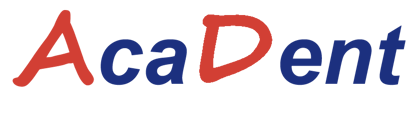FAQ
Welcome to the FAQ page of our dental administrative assistant course! Here, we address common questions and queries about our comprehensive training program designed for the Canadian job market to equip you with essential skills for success in dental office administration. Whether you’re curious about course content, certification, or career prospects, find clear answers and valuable insights to support your journey in the dental field. Explore our FAQs to learn more about how we can help you achieve your professional goals.
Is the certificate received at the end of the training recognized by employers?
The certificate issued at the end of the training is recognized and appreciated by employers. The dental training provided by Acadent has an excellent reputation within the dental community. It is carefully structured and validated by rigorous exams which attest the acquired skills and knowledge.
Once you have successfully completed the training, the certificate you receive will be the proof of your mastery of essential dental administrative skills. This document will be a valuable asset to present to future employers, demonstrating your commitment to quality training and your ability to contribute effectively to a successful dental team.
What is the average salary of a qualified dental administrative assistant?
The average salary varies depends on a variety of factors, including geographic location, experience level, dental office type, and other factors related to the dental industry. In general, the salary of a dental administrative assistant is between $25 and $35 per hour. However, it is important to note that this figure can vary significantly.
What dental software do we learn at the end of basic training? Is it common in dental clinics?
At the end of the basic training, you will learn how to use the A.D. 2.0 dental software. This software is widely adopted by many dental clinics. It is an online platform approved by the Association of Dental Surgeons of Quebec, among others. It is important to note that the market offers a large variety of dental software, but their basic functionalities are often similar.
Mastering dental software like A.D. 2.0 provides a valuable advantage, as many clinics rely on this type of software to manage their daily operations. Additionally, basic proficiency in dental software can make it easier to transition to other software if necessary. Understanding the fundamentals of how dental software works can enable graduates to quickly adapt to other software, enhancing their professional versatility.
What is the experience like when learning to use dental software online?
Learning dental software takes place in two distinct phases: the theoretical part and practical application. The theory is presented through video capsules. After learning the theory, the students practice the software functions under the careful supervision of a dedicated teacher (by Zoom). The last stage is the free practice, when the students can access and practice directly the online dental software, without supervision.
With this practical approach, there is no need to install dental software on your computer. The theoretical resources and practical exercises are all accessible via the Internet, allowing each student to acquire the necessary skills without having to clutter their computer with complex software installations.
I don’t have a credit card. Is it possible to pay for my course with a debit card or check?
If you do not have a credit card, you have the option of paying for your course by other means of payment such as a debit card or check. To opt for one of these alternative payment methods, please contact us by message and indicate your wish to proceed by Interac transfer or check. For Interac transfers, please use the following email address: info@acadent.ca. We are happy to offer you flexible options to make paying for your course easier.
How does the training take place?
We offer virtual classroom lessons. These sessions take place in real time via the Zoom platform, allowing you to interact directly with the teacher and other students. This is a great option for those who enjoy live chat and group discussions. The learning activities are adapted to the online environment. They include video presentations, case studies, live tests, group discusssions and research, etc.
How many hours of study per week are necessary to complete the training?
To complete the training in seven weeks, it is recommended to spend an average of six to eight hours of study per week. However, it is important to note that study time may vary depending on your personal learning pace, prior experience, and level of familiarity with the concepts covered in the course. Some weeks might require a more intensive investment of time, while others might be lighter. The goal is to give you a realistic estimate so you can plan your schedule accordingly and ensure effective learning throughout the training.
